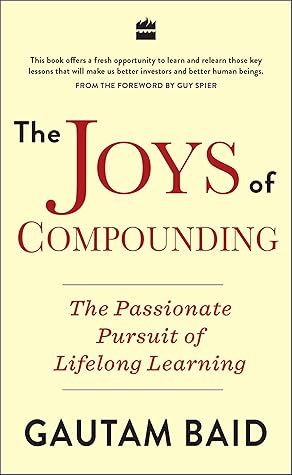More on this book
Community
Kindle Notes & Highlights
by
Gautam Baid
Read between
January 1 - January 22, 2022
What can go wrong?
What is the growth rate being implied by the market
Simplicity as a Way of Life
It is very simple to be happy, but it is very difficult to be simple. —Rabindranath Tagore
To attain knowledge, add things every day; to obtain wisdom, remove t...
This highlight has been truncated due to consecutive passage length restrictions.
CHAPTER 9
ACHIEVING FINANCIAL INDEPENDENCE
As Peter Lynch says, “In the long run, it’s not just how much money you make that will determine your future prosperity. It’s how much of that money you put to work by saving it and investing it.”2
“Why make all that money so you can save it?” to which I replied, “Why spend all that money so you need to earn it again?”
Benjamin Franklin was able to make the contribution he did because he had [financial] freedom. —Charlie Munger
Successful law career. Munger successfully practiced real estate law until he achieved about $300,000 in assets. This equaled ten years of living expenses for his family at the time (he had a wife and multiple kids).
Munger’s life as a blueprint,
Work hard, get an education, develop a valuable skill.
Use that work career and save up ten times your living expenses.
To accelerate wealth accumulation, you can take some risk and start some sort of business.
At some point, your investments will earn enough passive income to support your living expenses.
Spend each day trying to be a little wiser than you were when you woke up. Discharge your duties faithfully and well. Step by step you get ahead, but not necessarily in fast spurts. But you build discipline by preparing for fast spurts. … Slug it out one inch at a time, day by day. At the end of the day—if you live long enough—most people get what they deserve. —Charlie Munger
The Journey to the First Million
During my savings and wealth accumulation phase, I was willing to work as hard as I could, for as many hours as I possibly could, to reach this important milestone of the first million.
I was trying to save every single dime that I could during this endeavor. I never lost sight of Benjamin Franklin’s teaching: “Beware of little expenses; a small leak will sink a great ship.”
Resist Stepping on the Hedonic Treadmill
I saw that it was the artificial needs of life that made me a slave; the real needs of life were few. —William James Dawson
book Classics: An Investor’s Anthology features an essay about P. T. Barnum that quotes Barnum on the tendency for individuals to step on the hedonic treadmill:
CHAPTER 10
LIVING LIFE ACCORDING TO THE INNER SCORECARD
CHAPTER 11
THE KEY TO SUCCESS IN LIFE IS DELAYED GRATIFICATION
You must buy on the way down. There is far more volume on the way down than on the way back up, and far less competition among buyers. It is almost always better to be too early than too late, but you must be prepared for price markdowns on what you buy. —Seth Klarman
An Investor’s Biggest Edge
If you want to make money in Wall Street you must have the proper psychological attitude. No one expresses it better than Spinoza the philosopher … Spinoza said you must look at things in the aspect of eternity. —Benjamin Graham
FIGURE 11.1 The effects of small habits compound over time. For example, if you can get just 1 percent better each day, you’ll end up with results that are nearly 37 times better after one year.
SECTION III
COMMON STOCK INVESTING
CHAPTER 12
BUILDING EARNING POWER THROUGH A BUSINESS OWNERSHIP MIND-SET
The possibility of partly owning a business with a small investment corpus.
Minimizing risk through diversification.
Access to top-notch managers to run the business.
Buying business ownership on your own terms.
Opportunity to shoot rare, fast-moving elephants.
The invaluable flexibility of a quick and smooth exit.
Stocks Closely Resemble Bonds
In a 1977 Fortune article, Buffett explained how stocks closely resemble bonds.
CHAPTER 13
INVESTING BETWEEN THE LINES
CHAPTER 14
THE SIGNIFICANT ROLE OF CHECKLISTS IN DECISION-MAKING
Checklist routines avoid a lot of errors. You should have all this elementary [worldly] wisdom and then you should go through a mental checklist in order to use it. There is no other procedure in the world that will work as well. —Charlie Munger
Use the following general principles when devising a checklist: • Good checklists are brief, precise, efficient, and easy to use even under difficult conditions. They do not try to spell out everything and they provide reminders of only the critical and most important steps. • Bad checklists are vague, imprecise, too long, hard to use, and try to spell out every single step. • Checklists should be confirmed: perform jobs/tasks from memory and experience, but then stop, run the checklist, and confirm that everything was done correctly. • Checklists should be reviewed: carry out tasks as they
...more
After you have concluded the initial groundwork, study the following parameters in a checklist fashion.


